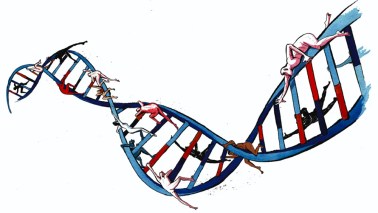Two gentle proselytisers debated in Toronto last night. The motion: ‘Religion is a force for good in the world’ was defeated by a margin of 68 percent to 32. The New Statesman has a complete transcript, but here a couple of quotations distilling the basic arguments.
Hitchens:
Once you assume a creator and a plan, it makes us objects, in a cruel experiment, whereby we are created sick, and commanded to be well. I’ll repeat that. Created sick, and then ordered to be well. And over us, to supervise this, is installed a celestial dictatorship, a kind of divine North Korea. Greedy, exigent, greedy for uncritical phrase from dawn until dusk and swift to punish the original since with which it so tenderly gifted us in the very first place.
Religion, it might be said, it must be said, would have to admit makes extraordinary claims but though I would maintain that extraordinary claims require extraordinary evidence, rather daringly provides not even ordinary evidence for its extraordinary supernatural claims.
Therefore, we might begin by asking, and I’m asking my opponent as well as you when you consider your voting, is it good for the world to appeal to our credulity and not to our scepticism? Is it good for the world to worship a deity that takes sides in wars and human affairs? To appeal to our fear and to our guilt, is it good for the world? To our terror, our terror of death, is it good to appeal?
To preach guilt and shame about the sexual act and the sexual relationship, is this good for the world? And asking yourself all the while, are these really religious responsibilities, as I maintain they are? To terrify children with the image of hell and eternal punishment, not just of themselves, but their parents and those they love. Perhaps worst of all, to consider women an inferior creation, is that good for the world, and can you name me a religion that has not done that?
Blair:
People are inspired to do such good by what I would say is the true essence of faith, which is along with doctrine and ritual particular to each faith, a basic belief common to all faiths, in serving and loving God, through serving and loving your fellow human beings. As witnessed by the life and teaching of Jesus, one of love, selflessness and sacrifice, the meaning of the Torah. It was Rabbi Hillel who was once famously challenged by someone that said they would convert to religion if he could recite the whole of the Torah standing on one leg. He stood on one leg and said: do unto others as you would have them do unto you. That is the Torah, the rest is commentary, now go and do it.
The message of the prophet Mohammed, saving one life is as if you’re saving the whole of humanity, the Hindu searching after selflessness, the Buddhist concepts of Kuruni … which all subjugate selfish desires to care for others, Sikh insistence on respect for others of another faith. That in my view is the true face of faith. And the values derived from this essence offer to many people a benign, positive and progressive framework by which to live our daily lives. Stimulating the impulse to do good, disciplining the propensity to be selfish and bad.
And faith defined in this way is not simply faith as solace in times of need, though it can be; nor a relic of unthinking tradition, still less a piece of superstition or an explanation of biology. Instead, it answers a profound spiritual yearning, something we feel and sense instinctively. This is a spiritual presence, bigger, more important, more meaningful than just us alone, that has its own power separate from our power, and that even as the world’s marvels multiply, makes us kneel in humility not swagger in pride.
If faith is seen in this way, science and religion are not incompatible, destined to fight each other, until eventually the cool reason of science extinguishes the fanatical flames of religion. Rather science educates us as to how the physical world is and how it functions, and faiths educates us as to the purpose to which such knowledge is put, the values that should guide its use, and the limits of what science and technology can do not to make our lives materially richer but rather richer in spirit.





Comments